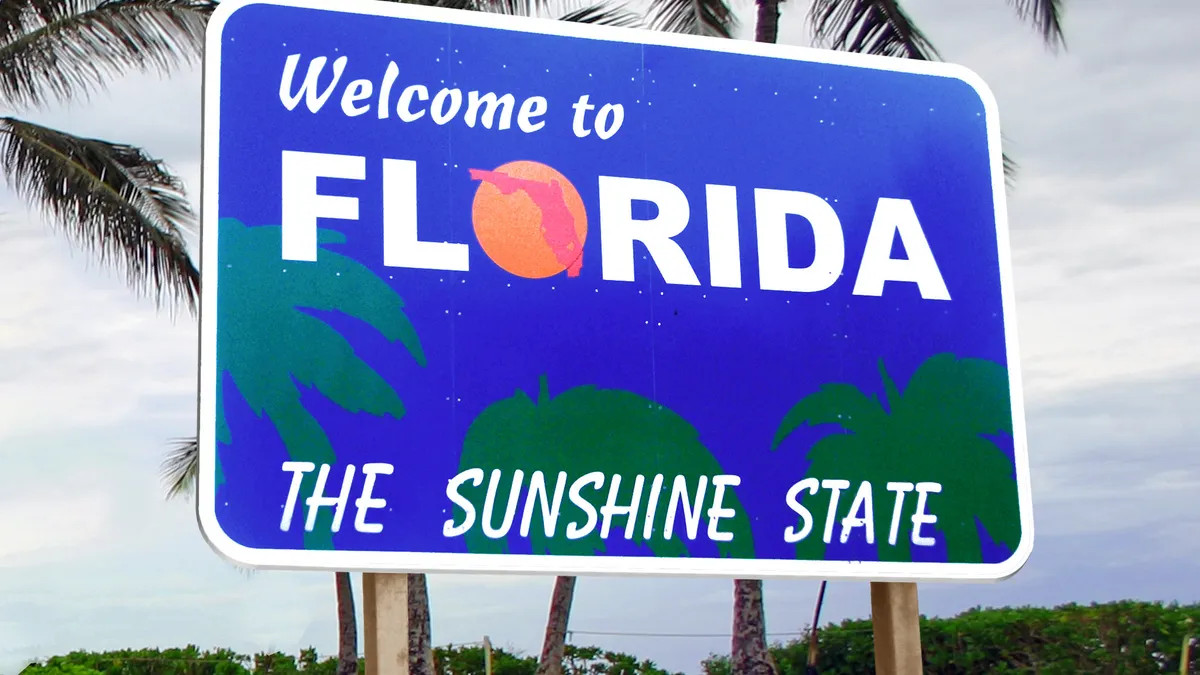UPDATE: June 23, 2021: Gov. Ron DeSantis signed the legislation on Tuesday. At a press conference that day, DeSantis said that "the norm is really these are more intellectually repressive environments," referring to colleges, according to a local news report.
Dive Brief:
-
Florida's legislature this week approved a bill requiring the state's public colleges to administer a yearly survey gauging how comfortable students, faculty and staff are expressing their views and beliefs on campus.
-
It contains other contentious provisions, including that students would be allowed to record instructors' lectures for potential use in a civil or criminal court case against their college.
-
The legislation now heads to Gov. Ron DeSantis, a Republican, for his signature.
Dive Insight:
The bill has been introduced several times before, but only gained traction this year after Republican victories in the recent election solidified their control of the state legislature and swung it further to the right, the Miami Herald reported.
Under the measure, the state's two higher ed systems would be forced to pick or create an annual assessment measuring "intellectual freedom and viewpoint diversity" on each public campus. Officials from the two systems would compile and publish the survey results by Sept. 1 every year, beginning on that date in 2022.
The legislation doesn't specify how those results would be used, spurring concern among faculty and observers that it would invite lawmaker interference among colleges if legislators were displeased with the findings. The bill text contains scant details about the assessment, other than that it should identify "the extent to which competing ideas and perspectives are presented."
Institutions also won't be able to limit students' and employees' exposure to speech "they may find uncomfortable, unwelcome, disagreeable, or offensive."
Policy experts point out this aspect of the bill is redundant, as public colleges are already covered by the First Amendment's speech protections.
The state's education board, which runs the 28-institution Florida College System, did not respond to an emailed request for comment. A spokesperson for the State University System of Florida said in an email that it and its governing board "support the First Amendment rights of our students, faculty, and staff."
Demetri Morgan, a higher education professor at Loyola University Chicago, said lawmakers are ignoring the history of Florida's public campuses going to great lengths to safeguard free speech. This follows a pattern of lawmakers nationwide increasingly intervening in colleges' operations, he said.
When prominent white nationalist Richard Spencer spoke at the University of Florida in 2017, the institution spent hundreds of thousands of dollars on security to ensure the talk could continue, even though school officials denounced his views, Morgan said.
Florida's lawmakers are treating colleges as though they are indoctrinating students to liberal values, he said, but that "just belies what is actually happening on campuses."
Morgan also raised concerns about the survey. Colleges already take the pulse of their communities through campus climate polls, and they have a host of other administrative tasks to handle, such as submitting data to the federal government and to U.S. News and World Report for its rankings, he said.
"You can only send out so many surveys every year," he said, noting the legislature didn't set aside funding for the new one.
A tool to discern how students' political views evolve while they attend college would be helpful, but it would have to be crafted to capture such nuance, Morgan said, which he doubted was possible.
Even one civil liberties watchdog in higher ed was critical of the bill. Joe Cohn, legislative and policy director at the Foundation for Individual Rights in Education, said the group was unconcerned about the survey.
However, Cohn said legislators have not worked out "the sweet spot" on the provision concerning classroom recordings, as he said it opens up the possibility of litigation, such as if a student published the audio without faculty members' consent.
"This is not the way to go," Cohn said. "And it could have tremendous consequences."















